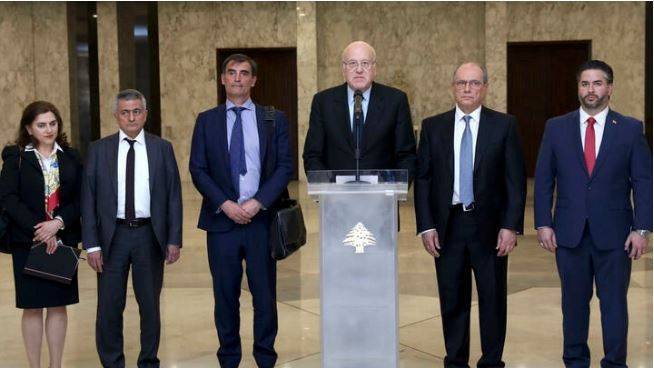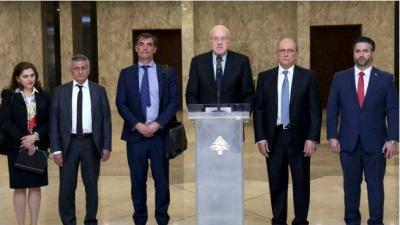The newspaper "Al-Jumhuriya" reported: Yesterday was a day full of positives, marked by the announcement of a preliminary agreement between the government and the International Monetary Fund (IMF), with implementation set to begin according to defined frameworks later on. This was followed by a significant thaw in relations between Lebanon and the Gulf Cooperation Council countries, exemplified by Saudi Arabia announcing the return of its ambassador, Walid Bukhari, to Beirut, and Kuwait also announcing the return of its ambassador, Abdalah Al-Qunai’i. This signifies the Gulf's return to Lebanon after a long hiatus.
These developments created a generally positive atmosphere in the country, suggesting potential relief starting today, especially in financial matters. Prominent government sources told "Al-Jumhuriya" that these developments were attributed to the quiet diplomacy employed by the government in handling these complex issues away from the noise. Contrary to some expectations that an agreement with the IMF would be difficult to achieve quickly, it materialized suddenly, along with noticeable improvements in Lebanese-Gulf relations, which were the result of Prime Minister Najib Mikati's diligent follow-up with the Kuwaiti side and through other channels related to Gulf countries.
These sources added that those who viewed matters pessimistically may have come to realize that such negativity is not beneficial for Lebanon; rather, constructive, goal-oriented work is what helps overcome all obstacles, particularly at this critical juncture where the country needs to address its issues calmly to provide necessary solutions, away from the often negative outcomes of haste.
The same sources confirmed that from today, the government will begin working on the agreement's implementation with the IMF in cooperation with the parliament. Meanwhile, Speaker Nabih Berri quickly welcomed this agreement, affirming that "the parliament is ready to support this achievement with serious work to secure the necessary legislations and reforms aimed at ensuring the success of the IMF-supported program and safeguarding the deposits of Lebanese citizens."
The government surprised everyone by reaching a preliminary agreement with the IMF to finance a $3 billion economic recovery program spread over 46 months. Regardless of the positive aspect of reaching this agreement, it is important to note that the IMF was the body pushing for this agreement, and the negotiating team may have made concessions on prior conditions to facilitate the agreement.
For example, whereas the IMF demanded the approval of a capital control law and the 2022 budget before the preliminary agreement, it retreated from these conditions and settled for promises heard from officials that the capital control and budget will indeed be passed.
Returning to the agreement, it includes a set of reform conditions that must be executed before the IMF Board of Directors approves any financing. Thus, this matter will be deferred until after the parliamentary elections, where the new government will take over the finalization of this agreement and convert it into a financing agreement. Among the most important conditions included in the preliminary agreement are:
- Cabinet approval of a bank restructuring strategy, and recognition and management of significant sector losses, while protecting small depositors and limiting recourse to public financing.
- Parliamentary approval to amend the banking secrecy law to align it with international anti-corruption standards.
- Completing the audit to determine the status of foreign assets in the Central Bank, to begin improving the transparency of this key institution.
- Cabinet approval of a medium-term strategy for restructuring public finances and debts.
- Parliamentary approval of the 2022 budget to begin restoring fiscal accountability.
- The central bank unifying exchange rates.
Basic Agreement
Lebanese sources negotiating with the IMF told "Al-Jumhuriya" that "the basic agreement has not yet begun, and the party concluding it is the IMF management with the Lebanese government, not the technical delegation at the employee level; however, it can be said that we have taken the first step, and we still have to implement the conditions required by the IMF as a mandatory pathway for signing the final agreement, which are the laws that must be issued by the parliament related to three laws concerning banks (restructuring, capital control, and amendment of banking secrecy) and the budget law, in addition to the financial auditing of the Central Bank's accounts and the unification of the exchange rate, which the central bank must have made a decision on. What we signed today with the IMF is greater than a framework agreement because we delved into details and provided what is now known as the Recovery Plan, which includes precise figures and not just general outlines but indicators and detailed plans over four years, but it will not come into effect without the approval of the IMF management and until Lebanon fulfills the prior conditions, meaning bluntly that the IMF will release no funds until the conditions are met, at which point the final signing will occur."
The sources added, "The three presidents are enthusiastic and welcomed the step, but this welcome must translate into dedicating all efforts to work in coordination and integration to show that hearts are witnesses. The IMF does not settle for support and statements but expects the executive and legislative authorities to work together swiftly to finalize the laws and reforms, as wasting time is not in Lebanon's interest. The sense of the reality's gravity requires connecting dawn with dusk to issue the laws within a week, with the bank restructuring law being a priority to understand each bank's capability and capital."
The sources concluded: "The IMF initiated... Will Lebanon seize the opportunity?"
Announcement of the Agreement
Prime Minister Najib Mikati announced this agreement with the IMF following a meeting that included President Michel Aoun, Deputy Prime Minister, the Ministers of Finance and Economy, and the head of the IMF mission, Ernesto Ramirez, along with several members of the mission. He pledged that he and the President support the "economic reform program that the ministerial committee mandated by the cabinet is negotiating with the IMF."
He stated: "These reforms will be on the cabinet's agenda in the coming sessions before the parliamentary elections to frame them as draft laws sent to the esteemed parliament. We hope that the parliament will consider these matters as soon as possible. The decision lies with the parliament, not with us."
He added: "The timeframe is for its approval, and it will then be ratified by the IMF Board of Directors, with Lebanon under supervision for proper implementation." He noted that the financial amount provided by the IMF "is not paid all at once but in stages, and it is not only the amount agreed upon; rather, based on the implementation of the reforms we take, this amount will increase."
He emphasized that "the timeframe of the agreement set at 46 months is linked to the improvement of the Lebanese economy, and we are convinced that when we provide trust and reassurance to the Lebanese economic system, conditions will improve rapidly."
The Pain Phase
A high-ranking official source told "Al-Jumhuriya" after announcing the preliminary agreement with the IMF that "the phase of pain has begun now, but it is a mandatory pathway out of the tunnel, and after about three or four years, we will begin to regain our vitality."
Capital Control to Committees
Coinciding with the signing of the preliminary agreement between Lebanon and the IMF, Speaker Nabih Berri referred the capital control bill to the joint committees, which are likely to convene next Wednesday. On their agenda, in addition to the capital control bill, are the law on free and special economic zones and the law on economic zones for technology and information.
French Approval
The French ambassador to Lebanon, Anne Grillo, welcomed Lebanon's agreement with the IMF, tweeting: "I welcome the signing of a detailed agreement between the IMF and Lebanon. This is an important step toward adopting the organization's program. It is a necessary step, as it is the only way out of the crisis. Work has just begun. France will continue to support Lebanon on the path of reforms and recovery."
Gulf Return
Amid the follow-up on the agreement with the IMF, the Saudi Foreign Ministry announced in a statement the return of its ambassador, stating: "In response to the calls and appeals of moderate national political forces in Lebanon and confirming what the Lebanese Prime Minister mentioned about the Lebanese government's commitment to taking the necessary measures required to enhance cooperation with the Kingdom and the Gulf Cooperation Council countries and to cease all political, military, and security activities that affect the Kingdom and the Gulf Cooperation Council countries, the Ministry of Foreign Affairs of the Kingdom of Saudi Arabia announces the return of its ambassador to the sisterly Republic of Lebanon. The Kingdom affirms the importance of Lebanon's return to its Arab depth, represented by its national institutions and agencies, and that Lebanon may enjoy security and peace, and that its people may achieve stability and safety in their homeland."
Mikati welcomed Bukhari's return and wrote via Twitter: "We appreciate the Kingdom of Saudi Arabia's decision to return its ambassador to Lebanon, and we affirm that Lebanon is proud of its Arab belonging and is committed to the best relations with Gulf countries, which have been and will remain a support and a pillar." Shortly after the Saudi announcement, Mikati was informed by the Kuwaiti ambassador Abdalah Al-Qunai’i of the Kuwaiti government's decision for his return to Beirut before the weekend, which is expected today. Mikati confirmed that "what unites Lebanon and Kuwait is a historic relationship of solid brotherhood that becomes stronger over time." He thanked Kuwaiti Foreign Minister Sheikh Ahmad Nasser Al-Mohammed Al-Sabah for "the efforts made to restore Lebanese-Gulf relations to their clarity and vitality."
The Kuwaiti Foreign Ministry stated in a statement: "In light of the Lebanese response to the Kuwaiti Gulf initiative and in response to the appeals launched by moderate national political forces in Lebanon, and in reaction to the commitment made by the Prime Minister of the sisterly Republic of Lebanon to take the necessary measures required to enhance cooperation with Kuwait and the Gulf Cooperation Council countries and to stop all political, military, and security activities that impact the Gulf Cooperation Council countries, the State of Kuwait announces the return of its ambassador to the sisterly Republic of Lebanon. The ministry emphasizes the importance of the Republic of Lebanon and its return to its Arab surroundings with all its national institutions and agencies, expressing hope that peace and security will prevail in Lebanon."
Mawlawi Welcomes
Interior and Municipalities Minister Bassam Mawlawi commented on Bukhari's return via Twitter, writing: "Again, the Kingdom of Saudi Arabia proves, through the return of its ambassador, Minister Plenipotentiary Walid Bukhari, that Lebanon is in its heart and conscience, and it will never leave it." He continued: "We welcome you among your loyal people to strengthen the bonds of brotherhood. Together, we will continue to work to strengthen relations that we will ensure remain unscathed from any harm or insult from now on."
Lebanon's Position on Russia's Membership
On another note, Lebanon abstained from voting yesterday on a resolution proposed by Western countries in the United Nations Human Rights Council in Geneva, which involved suspending Russia's membership in the council. Foreign Minister Abdullah Bou Habib told "Al-Jumhuriya" that the reason for abstaining from voting is that Lebanon believes dialogue constitutes the best means to resolve disagreements and disputes, rather than using military force, pointing out that if Russia is expelled from the Human Rights Council, there would be no dialogue.
He stressed the rejection of the politicization of the work of international and regional organizations, noting that the Arab Foreign Ministers Council, which has now transferred its presidency to Lebanon, also opposed politicization during its last conference. Thus, we are consistent with the Arab direction.




